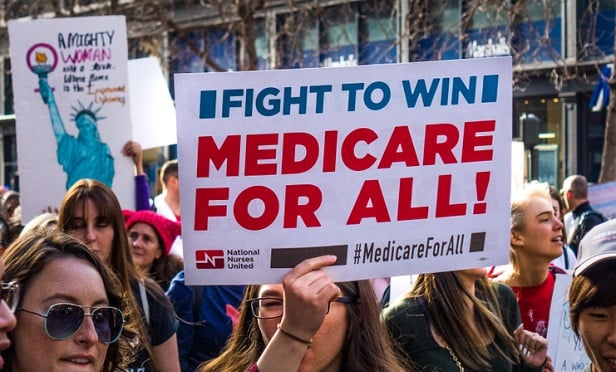 Among Medicare beneficiaries, 58 percent now say Medicare should remain primarily for people age 65 and older, up from 42 percent in each of the prior two years. (Photo: Shutterstock)
Among Medicare beneficiaries, 58 percent now say Medicare should remain primarily for people age 65 and older, up from 42 percent in each of the prior two years. (Photo: Shutterstock)
A majority of Medicare enrollees now say that the federal health insurance program should remain primarily for people age 65 and older, according to eHealth's report, "Medicare Beneficiaries on 'Medicare for All.'"
eHealth surveyed more than 1,000 individuals who purchased Medicare insurance plans through its online platform, and found that support among beneficiaries is down for Medicare for All. Just over a third (37 percent) of the respondents say that all Americans should have access to Medicare or Medicare-like coverage, compared to 41 percent in 2019 and 31 percent in 2018.
Related: Latest study pegs Medicare for All savings at $450 billion annually
In fact, the opposition is growing: 58 percent of Medicare beneficiaries now say Medicare should remain primarily for people age 65 and older, up from 42 percent in each of the prior two years.
Perhaps not surprisingly, support for "Medicare for all" is varied among beneficiaries of different income levels. The proposal is most appealing to highest-income earners: 47 percent of those with annual incomes of $100,000 or more support Medicare for All, followed by 42 percent for those with incomes less than $25,000 per year. For middle-class beneficiaries with incomes between $75,000 and $100,000, just 33 percent support expanding the federal program (the survey results do not detail the support level among people with incomes between $25,000 and $75,000).
"We have been tracking consumer sentiment on Medicare for All proposals for some time now but the results of our most recent survey surprised us," says eHealth CEO Scott Flanders. "As we get deeper into election season and Medicare beneficiaries listen to candidates and weigh the pros and cons of various proposals, it seems that support for a radical revamp of the Medicare program, and for Medicare for All candidates, is dropping."
Support for Medicare for All candidates is decreasing among Medicare beneficiaries: 32 percent of respondents now say they would support a Medicare for All presidential candidate (at this point, just Sen. Bernie Sanders), down from 35 percent in 2019. Opposition is rising: 43 percent now say they would not a support a Medicare for All candidate, compared to 36 percent in last year's survey, while 25 percent told pollsters that they are still undecided on whether they would support a Medicare for All candidate, compared to 29 percent in 2019.
Broken down by gender, 48 percent of men and 38 percent of women now say they would not support a Medicare for All candidate for president, up from 44 percent of men and 31 percent of women in 2019.
Of all of the respondents, 52 percent say they consider it very or somewhat unlikely that a Medicare for All program would be implemented even if a Medicare for All candidate would be elected president. Just 26 percent of respondents consider it very or somewhat likely the program would be successfully implemented, compared to 31 percent in 2019.
However, when broken down by age, the youngest Medicare beneficiaries are more likely than older ones to consider Medicare for All possible: 38 percent of respondents younger than age 65 consider it very or somewhat likely that a Medicare for All program would be successfully implemented if a candidate supporting it were elected, compared to 19 percent of those age 80 and older (the survey results do not detail the sentiment of respondents between the ages of 65 and 79).
Read more:
© 2025 ALM Global, LLC, All Rights Reserved. Request academic re-use from www.copyright.com. All other uses, submit a request to [email protected]. For more information visit Asset & Logo Licensing.








